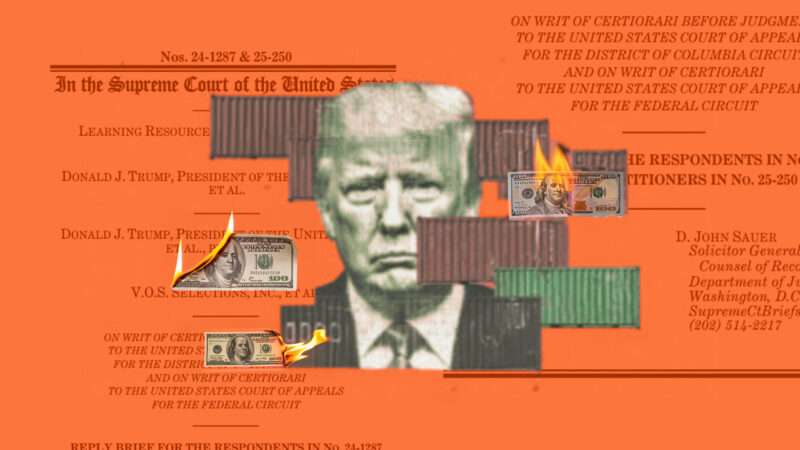
On Wednesday, the Supreme Court will hear arguments on the constitutionality of tariffs that President Donald Trump has imposed under the International Emergency Economic Powers Act (IEEPA). The Trump administration faces several issues in its case, not the least of which is that IEEPA does not mention tariffs, duties, or any synonym in its text. Still, if the administration manages to persuade the Supreme Court that IEEPA grants the president the power to tariff imports, the statute would also grant him the power to tariff exports, which is unconstitutional.
The administration will likely reiterate during oral arguments what it emphasized in its final reply brief: Trump's IEEPA tariffs are not taxes—as all revenue-generating tariffs have been understood to be—but importation regulations and, as such, are constitutional.
Even if that were true, it would still be a weak argument.
Under IEEPA, the president has the power to regulate imports during a national emergency. The administration argues that tariffs are a way to regulate imports, not a form of taxation, so Trump's tariffs are legal. Moreover, the administration argues that Congress' delegation of power is constitutional because it pertains to national security, an area in which the president wields broad power.
Lower courts have already rejected the argument that tariffs are regulations, not taxes. When it ruled against the administration's tariffs in August, the U.S. Court of Appeals for the Federal Circuit said it was "unlikely that Congress intended, in enacting IEEPA, to depart from its past practice and grant the president unlimited authority to impose tariffs." The court highlighted the fact that every law delegating tariff authority to the president includes "specific substantive limitations and procedural guidelines to be followed in imposing any such tariffs." IEEPA includes no such guidelines or limitations.
Only one president before Trump—Richard Nixon—interpreted the delegated power to regulate imports as a way to impose tariffs. In 1971, Nixon invoked the Trading With the Enemy Act (TWEA) to set a 10 percent tariff on imports in response to the economic turbulence caused by the end of the Bretton Woods system. A federal court deemed Nixon's tariffs legal, ruling them sufficiently constrained by a limiting principle. But in 1977, IEEPA was passed, ironically enough, to "limit the expansive powers that presidents had under [TWEA]," explained Peter E. Harrell, an attorney who served as the senior director for international economics at the White House's National Security Council and the National Economic Council during the Biden administration.
If the Trump administration succeeds in arguing that the president's ability to regulate imports under IEEPA means that it can implement tariffs, it immediately runs into other problems. If regulate means tariff, then it applies to exports as well as imports because IEEPA regulates "importation or exportation." But the Constitution forbids Congress from imposing taxes or duties on "Articles exported from any State," and Congress cannot delegate powers it does not itself possess to the president.
Even if the Court accepts such a maneuver, the administration's argument would face yet another legal impediment: the canon against surplusage, which "tells courts to give effect to every clause and word of a statute so that none is rendered superfluous." In Marx v. General Revenue Corp. (2013), the Court ruled that "the canon against surplusage is strongest when an interpretation would render superfluous another part of the same statutory scheme." The administration's assertion that IEEPA grants the president unbridled tariff authority would violate this canon by rendering all laws regarding customs duties redundant. Likewise, reading tariffs into the Commerce Clause would render superfluous the Taxing Clause, which includes the power to lay "duties" and "imposts," argues the New Civil Liberties Alliance, a public interest law firm.
The Supreme Court has a chance to strike down one of the most damaging policies of the second Trump administration. The weakness of the Trump administration's arguments seems to bode well for the American consumers and business owners who have been harmed by the president's IEEPA tariffs. Still, there's always a chance that the Court sides with the president. If that happens, Trump will possess nearly unlimited tariff power on imported goods, and the separation of powers will continue to erode.
The post As Tariff Case Heads to the Supreme Court, Trump's Strongest Argument Has a Fatal Flaw appeared first on Reason.com.







